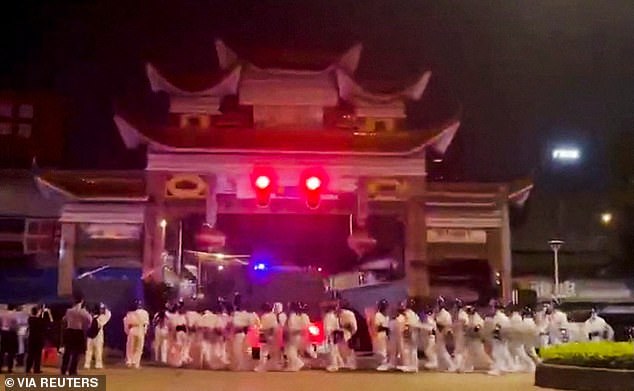
Amid the bustling streets of Guangzhou in southern China, chaos erupted as protesters clashed with riot police, donned in hazmat suits, in a display of defiance against President Xi Jinping’s oppressive regime and his controversial zero-Covid policies.
Shouts and the shattering of glass reverberated through the air as demonstrators confronted the heavily equipped riot police. The police, clad in hazmat suits for the first time, advanced towards the protesters, dragging them away to undisclosed locations as the violent scenes unfolded in Guangzhou.
These protests marked a significant departure from the norm in China, standing out as spontaneous, nationwide demonstrations against the central government. Despite the brutal crackdown, demonstrators persisted in taking to the streets, challenging Xi’s government and its authoritarian rule.
The unrest escalated on a fateful Tuesday night when riot police, their formation intimidatingly visible to onlookers in a local market, marched through the streets of Guangzhou. The tension soared as protesters hurled glass bottles at the police, met with a defensive shield of officers tightly grouped together.
In the midst of the chaos, tear gas canisters were unleashed by the riot police, triggering panic among the protesters who scattered in an attempt to escape the acrid fumes. A disconcerting scene unfolded as several protesters, hands bound with cable ties, were forcibly taken away by the police to an uncertain fate.
These turbulent events, uncommon in China’s authoritarian state, unfolded as Beijing’s top security body issued a stern warning of a forthcoming crackdown. The protests, spreading from Beijing to Shanghai, marked the most significant challenge to Xi’s government in his decade-long rule.
The catalyst for the widespread unrest stemmed from an apartment fire in Urumqi, where ten lives were lost. Many attributed the tragedy to the strict Covid curbs in place for months, hindering rescue efforts and escape. The ensuing protests expressed frustration not only with the zero-Covid measures but also with a yearning for broader political freedoms.
As the demonstrations unfolded across major cities like Beijing and Shanghai, voices echoed against the stifling ‘zero-Covid’ policies, revealing a deep-seated desire for change. The lockdowns, designed to curb the spread of the virus, intensified a sense of powerlessness among the populace, fueling the protests.
In Guangzhou, a city grappling with high infection numbers, a resident recounted witnessing a substantial police presence in Haizhu district, where arrests were made. China’s top security body, overseeing domestic law enforcement, signaled a zero-tolerance approach, calling for a crackdown on what they deemed ‘hostile forces.’
In the aftermath of the protests, authorities in Beijing and Shanghai sought to intimidate protesters by visiting their homes, compiling written records, and detaining those who had shared protest videos on social media. Despite these measures, solidarity protests emerged globally, drawing attention to China’s internal turmoil.
China’s battle against Covid, marked by strict control measures and continued travel restrictions, has taken a toll on its economy. As the nation faces challenges in reopening while grappling with low vaccination rates, concerns mount about overwhelming the healthcare system and the potential for a significant loss of life.
The unrest in China, coupled with its economic struggles, has attracted global attention, with the International Monetary Fund chief hinting at a possible downgrade in China’s growth forecasts. The protests, a rare occurrence in China’s recent history, serve as a stark reminder of the changing dynamics within the nation, testing the social contract between the Communist Party and its citizens.
RELATED ARTICLES
- UK Warns that China is Preparing for Total Nuclear War with the West
- Russia & China Plan Building Nuclear Power Plant on the Moon
- China expands Social Credit Score to include Central Bank Digital Currencies
- Italian Health Minister Faces Murder Charges Over COVID-19 Vaccine Deaths
- Brazil's Ministry Of Health Mandates Covid Jabs For Children As Young As 6 Months











